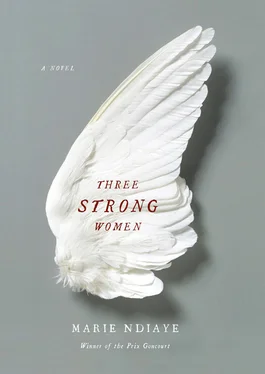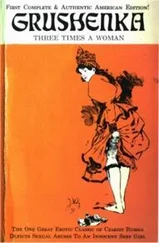She opened her mind once again to those insipid pipe dreams that had for her stood in place of thoughts ever since she’d first come to live with these people, forgetting, indeed being quite incapable of remembering, her terror a few moments earlier at the notion of having to leave, not that she wished to stay (she wished for nothing), but as she believed those dreams would not survive such a radical change in her situation, and she would have to ponder, undertake, and decide a number of things (including where to go), no prospect, given her present languor, could have been more terrifying.
Gray snakes on a yellow ground biting their tails, and cheery women’s faces, brown on a red ground above the inscription “Year of the African Woman,” adorned the cloth from which the sisters had made themselves skirts; the snakes and faces, repeated several times, were monstrously crushed by the folds of the fabric, and they danced in a cruel ring inside her head, displacing the kind, cloudy face of her husband.
It seemed to Khady that the two sisters, whose gaze she normally avoided, were gazing at her derisively.
One of them straightened her skirt without taking her eyes off Khady, and now her hands, as they smoothed the fabric insistently, seemed to Khady as dangerous, provocative, and indecipherable as they’d earlier appeared helpless and artless when upturned and at rest.
Khady was hugely relieved when with a wave of her hand her mother-in-law indicated that she was done and that Khady could leave the room.
She’d no idea what had just been said to her about the circumstances of her departure — when she’d leave, where she’d go, with what aim, or how — and since for the next few days no one spoke to her again or paid her any mind, and she went to market as usual, the worrying possibility of her world being turned upside down got mixed up in her head with the memory of the printed snakes and faces, taking on their phantasmagorical and absurd character before sliding into the oblivion to which all pointless dreams are consigned.
Then one evening her mother-in-law prodded her in the back.
“Get your things,” she said.
And since she was afraid Khady might take what didn’t belong to her, she spread out on the floor of their shared bedroom one of Khady’s batiks, placing on it the only other one she herself possessed, together with an old faded blue T-shirt and a piece of bread wrapped in newspaper.
She folded the batik carefully and tied the four corners together.
Then slowly, with an air of solemnity full of pique and regret, she drew a wad of cash from her bra, and (knowing that Khady had no bra of her own?) slid her hand roughly under Khady’s belt and into the top of her panties, tucking the money between the elastic and the skin, which she scratched with her yellow nails.
She added a piece of paper folded in four, which contained, she said, the cousin’s address.
“When you get over there, to Fanta’s, you’ll send us money. Fanta must be wealthy now, she’s a teacher.”
Khady lay down on the mattress she shared with her sister-in-law’s children.
She was so terrified she felt sick.
She closed her eyes and tried to call to mind those chalky, shimmering dreams that protected her from intolerable contact with a reality that her anxious, grief-stricken heart full of remorse and doubt had made her a part of, tried desperately to detach herself from the feeble, timorous person she was, but that night her dreams weren’t up to battling life’s intrusions. Khady was left face-to-face with her terrors, and no effort at willed indifference could free her from them.
Her mother-in-law came to fetch her at dawn, silently indicating to her to get up.
Khady stepped over her sisters-in-law lying on the second mattress, and although she had no wish to hear their harsh, mocking voices or see their pitiless eyes shining in the gray light of dawn, it seemed to her a bad omen that the two women were pretending to be asleep at the moment of her departure into the unknown.
Was it because they were sure of never seeing Khady again that they chose to avoid the trouble of looking at her, of waving a hand, of lifting a kindly, angelic palm toward her to say good-bye?
That was it, no doubt: Khady was walking toward her death, and so, swayed by the very understandable fear of getting involved somehow in her fate, they chose to have nothing further to do with her.
Khady stifled a moan.
In the street a man was waiting for her.
He was dressed in Western clothes: jeans and a checked shirt. Although the sun had barely risen he wore gleaming sunglasses, so that when tiny, anxious Khady, her bundle pressed against her chest, was pushed toward him by her jumpy, irritated, impatient mother-in-law, she couldn’t tell whether he was looking at her, but she could see herself reflected in the twin mirrors of his glasses.
She noticed his habit of biting his lower lip, so that the lower part of his face was constantly moving, like the jaw of a rodent.
Her mother-in-law quickly put a few banknotes in his hand and he stuffed them in his pocket without looking at them.
“You mustn’t come back here,” she murmured in Khady’s ear. “You must send us some money as soon as you get over there. But if you don’t make it, you mustn’t come back here.”
Khady made as if to clutch the old woman’s arm, but she slipped quickly inside the house and shut the door behind her.
“It’s this way, follow me,” the man said in a low, flat tone.
He started down the road without bothering to make sure Khady was behind him, as if, she said to herself, following in his footsteps, tottering clumsily in her pink plastic flip-flops while he seemed to leap along on the light, thick soles of his sneakers, he didn’t doubt for a second her interest in accompanying him, or as if, having been paid in full, he couldn’t care less what she did.
Such lack of concern about her Khady found somewhat reassuring.
As soon as she stopped thinking about that, taking care not to get left behind or lose one of her flip-flops, she found her mind being invaded by the usual fog, this time shot through not with the dead faces of her husband or grandmother but with the images she saw as she followed in the man’s footsteps along streets that she couldn’t recall ever having been down before, although, she suddenly thought, she could have walked through them in her usual stupor and mental prostration without remembering it — whereas it seemed to her that, this morning, the most humble scenes along the way were gently insisting on their permanence in a kind of rear projection on the screen of her dreams.
Was it possible that, now finding herself cast into the unknown, wrenched from her dangerous torpor, she was being protected in spite of herself?
What surprised her more was the twinge of grief she felt on seeing a pregnant woman sitting under a mango tree feeding a small child boiled rice.
She’d not felt for a long while — not since she’d gone to live with her husband’s family and everything had frozen inside her — that great distress at not having had a baby, that immense, bitter grief unconnected with any reflex of shame in the face of those around her.
And now she was gazing at the woman instead of merely glancing at her, unable to take her eyes off that swollen belly and the smeared lips of the little boy, and thinking sadly, Won’t I, Khady, ever have a child? She was however less sad than surprised at being sad, at identifying the emotion that, in an obscure, almost gentle way, stirred a part of her that had grown accustomed to feeling merely sluggish or terrified.
She hurried on because the man in front of her was walking quickly.
A young woman who could have been her, Khady, in her previous life came out onto the pavement and removed the wooden panel that covered the only window of her drinks stall, and on seeing that long, slender body, narrow at the hips and shoulders, with barely a perceptible waist, but as compact and vigorous in its slimness as the body of a snake, Khady recognized a shape very much like her own, and she reawakened to the action of her own muscles in enabling her to move so quickly, of their forgotten vigor and unfailing presence, of the whole of her young body, which she no longer paid the slightest attention to but which she now remembered and rediscovered in the bearing of this unknown young woman, who was arranging on the counter the fizzy-drink bottles she was about to sell and who, with her calm, focused reserve, could have been Khady, in an earlier life.
Читать дальше












